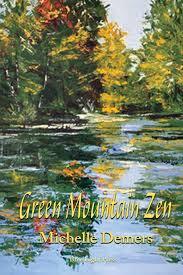Michelle Demers 4/29/19

Vermont Poet Michelle Demers, whose new collection is Green Mountain Zen (Blue Light Press).
This week's Write the Book Prompt was generously offered by my guest, Michelle Demers, who has a large staple of writing books from which she pulls exercises for herself and her classes. The exercise, titled "The Word Hoard," appears in The Cambridge Introduction to Creative Writing, by David Morley. Morley writes, “You should try to do this exercise every day, not only to keep your writing mind limber, but also to create a hoard of original and unusual phrases from which you can draw when you are writing. ‘Word hoard’ is a ‘kenning’ (a Norse poetic device ...), meaning ‘a supply of words’, such as a book, or vocabulary itself.”
Go to a shelf of books of fiction or poetry. Take one book at random. Close your eyes while opening that book and place your finger somewhere in it. Your finger will have landed on a word or words. Write the word down, as well as the three words preceding it and the three words following it in the text. You now have a seven-word phrase. Write this phrase in your notebook and, once you have written it, keep writing for five minutes. There are only two rules to this game: you must not stop writing; and you must not think. Try to write as fast as you can. You are not producing a work of art. After five minutes, you should have covered quite a lot of pages. Now read what you have written. Read it forwards, then read through it, word for word, backwards. Underline one phrase that strikes you as possessing any one of the following qualities: it has energy; it surprises you; it has never been written before in your language. The phrase must make a kind of sense; it must possess its own inner sense at the very least. That is, it must not be completely opaque in meaning. It might be a whole sentence, or it might be the end of one sentence and the beginning of the next. Now, write a short story or poem in which this phrase occurs without it seeming in any way out of place. You might wish to place the phrase into the mouth of a speaker in the poem or story, for example.
A I M : When we strive to be original, we tend to get tongue-tied, for we have been long taught that originality is no longer possible. ... this ‘free-writing’ exercise is effective for warming up for writing, but it is also effective at creating unusual phrases, ones that possess a surprising amount of personal linguistic energy. You are trying to capture ideas and sentences that you would not ordinarily come up with consciously.
Good luck with your work in the coming week, and tune in next week for another prompt or suggestion.
Music: Aaron Shapiro
Listen at:
https://podcasts.apple.com/us/podcast/michelle-demers-interview-559-4-29-19/id277452617?i=1000436989008
- 4:51am By The River by Riley Lee on As the Water Flows (Antiquity Records)
